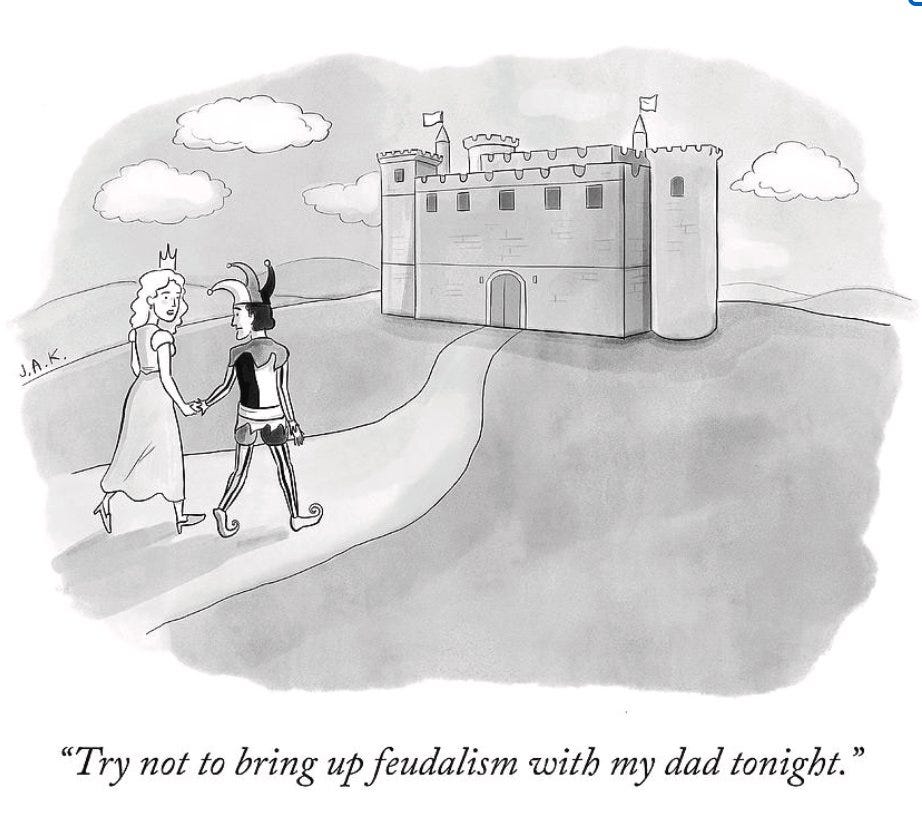Having programs that work: what would it take?
And other things I found on the net this week
Having programs that work: what would it take?
Here’s an interview with Henry Leveson-Gower, Founder and CEO of the NGO Promoting Economic Pluralism. I enjoyed doing it but it’s also got some good responses from people I respect like this one from Antonios Sarhanis
Really good conversation.
It's applied Burnham and Coase!
Which is a nice thought. I played it to myself for a while and it does rollick along quite well I think (though I muck up one or two explanations — sorry about that!).
Here’s the introductory blurb from Henry in his Mint Magazine.
It is very important think about how policy itself could pick up [on successful programmes]. And by that I don’t mean fund it and have some pilots, because everyone does that. I mean build a mechanism in which, if a program starts performing much better than what we are doing, that it starts to expand and be funded, while the legacy stuff starts to get defunded.
Now that simply doesn’t happen. We speak as if it’s happening but it’s not happening. Bureaucrats have quite a lot of good will, but even if you were trying, this would be a really hard thing to do - but we are not really trying. Everyone’s going through the motions, filling in the forms, protecting their minister from embarrassment, appearing in prime minister’s questions. And it’s sort of, in a thousand subtle ways, it’s basically impossible to have this new method displace the old one.
Innovative economic thinker, Nicholas Gruen, has been seeking to influence policy and programmes for many years in Australia and beyond. Unlike many policy proponents, he has a deep understanding of the political-economic system and how it can act as a barrier to positive innovation, particularly under the glare of Murdoch’s media. The Mint talked to him about attempts to innovate in poverty alleviation programmes and how ultimately power inequality undermines them.


Mutually Assured Engagement
Why Social Media Conflicts Are Disguised Collaborations
Ian Leslie has a good analysis of the spat between Greta Thunberg and Andrew Tate. First the facts:
Andrew Tate was returned to Twitter shortly before Christmas and promptly set about trolling Greta Thunberg, addressing her in a tweet about his “33 cars”. He asked for her email, “so I can send a complete list of my car collection and their respective enormous emissions”.
Thunberg, who has nearly six million followers on Twitter, chose to reply. Above a quote of Tate’s tweet, she wrote “yes, please do enlighten me. email me at smalldickenergy@getalife.com”. It was pretty funny. Twitter went into ecstasy. Everyone agreed Greta had done the “greatest tweet of all time”, as Kellyanne Conway’s husband George put it (ah, the mysteries of the human heart). …
Leslie’s point is that in a sense the antagonists are collaborating — collaborating to acquire the currency of our time — attention. That's why Leslie is critical of Greta — for giving Tate oxygen
Fair enough. But conversations are the building blocks of the public good that is our operating system — our culture and language.
“Culture wars” are conflict equilibriums in which the participants on both sides can gain status by scoring points off one another while tacitly agreeing on what is at stake and how to argue over it. Andrew Tate and trans activists are ostensibly at opposite ends of the political spectrum, but both gain from an equilibrium in which gender identity is considered a matter of life and death. ‘Anti-racists’ and far-right racists both view race as the governing factor in human relations. (I don’t see these sides as morally equal, but neither believes that indifference to race is possible or desirable). They score points off each other online, but as with the Thunberg-Tate exchange, real world impact is not high on the agenda. In America between 2019 and 2021 there was a 51% rise in killings of black women and girls. If there has been too little attention paid to this moral atrocity, perhaps that’s because the problem is an awkward fit for the terms of the “racists vs anti-racists” social media game.
So something momentous has happened and there's an analogy
Until financial globalisation of recent times, as people became wealthy they acquired a heightened interest in the stability and basic justice of their nations of origin. That's where their wealth was, so if they wanted to hang onto it, they should support the basic social and political infrastructure of the rule of law at least to the point of protecting property rights. Now, not so much!
Now the billionaires and oligarchs of poor and corrupt countries just funnel their wealth to a secret tax haven and keep their private jet ready for their final departure.
In a similar way, conversations were our way of slowly building social consensus — one conversation at a time to determine what we all felt was reasonable, what was beyond the pale.
Small conversations were scaled through representation, word of mouth and mass media. It wasn't perfect, but it was the best we could do.
Now, we have apex conversations. And here's the thing, the more one dimensional they are, the more they partake of a Punch and Judy show, indeed the more UNHINGED they are, the more prominent and influential they are.
So that's what's cultivating our cultural public goods, our operating system for the 21st-century
#HeavenHelpUS
A new solution to the trolley problem
HT: Andrew Mackie
Why Do Kids Hate Music Lessons?
An interesting piece with a sting in the tail.
The final piece I learned with any aplomb was Mozart’s Violin Concerto no. 3 in G Major with a Sam Franko cadenza. The cadenza was a little beyond me: the fingering too tricky, my apathy too high. Playing it was like trying to grasp something just out of reach; with the next stretch, my ligaments would tear and bones would pop out of their sockets. This caused my teacher, my mother, and me angst in no small measure.
As my final concert approached, I quit without notice, like the hero of Thomas Bernhard’s novel The Loser who abandons music on realizing he would never “play as well as Glenn Gould.” I skipped the concert, didn’t perform the Mozart Concerto, never mastered Franko’s cadenza.
A few years later, I attended a performance by the violinist James Ehnes, born in Brandon, Manitoba, the city where I had taken lessons. On the programme that night was Mozart’s Concerto in G Major with the Franko cadenza. Ehnes is an undisputed technical master of the violin and emotional conduit of music. Halfway through the first movement, he flubbed a short fill of notes. It was brief but unmistakable. Then the moment passed, his fingers gliding over the error as if nothing had happened. In that brief moment, I caught a glimpse of his face. …

The great anti-ESG backlash
The steaming pile of BS that is ESG is coming under some pressure. That could be a good or at least have good things about it. Sadly, it’s mostly doing harm since one positive thing ESG has done is raise the cost of capital to fossil fuel investment. Even here though, I’m not at all sure raising the cost of capital to developing natural gas is necessarily good for anyone. Naturally, the right way to do this is with carbon pricing. Alas, that’s very difficult because of a cast of baddies.
Anyway, the Spectator is pretty happy about it all.
The ESG story starts in 2004, when the three-letter acronym appeared in a UN report arguing for environmental, social and governance considerations to be hardwired into financial systems. Since then the term has been on a long but rapidly accelerating journey from NGO-world obscurity into the financial mainstream and subsequently the political limelight, prompting strong reactions from a chorus of prominent figures. Elon Musk calls it “a scam.” Peter Thiel says it’s a “hate factory.” Warren Buffett describes it as “asinine.”


To promote innovation, promote people not ‘outputs’
A nicely argued piece explaining why funding academic and research ‘outputs’ is a mug’s game. I’m not sure I fully buy into its proposal as if it’s the answer, but it’s closer to the answer than the strange place research finding finds itself today.
The ‘transfer from science’ linear model still works in some high-tech manufacturing sectors, such as chemicals, pharmaceutical and electronics, but the economic size (but not necessarily importance) of high-tech manufacturing has declined to only 3% of the UK economy. Most of the other 97% are services that are typically consumed as they are produced. Sustained service delivery requires innovations in the underlying processes and infrastructure. For example, paying bills on a phone app requires a data-intensive network connecting banks, mobile networks, customers, and their accounts. Although service sector innovations rarely draw directly from R&D, this doesn’t mean research isn’t important. On the contrary, the growing importance of research to these sectors is possibly the most important issue for current science policy.
In our current economy, problems require service innovation, and it is unlikely that pre-existing ‘answers’ exist waiting to be found in the academic literature. Firms need to undertake formal and informal research, which is why firm-level downstream investment is so important. Sometimes experimentation draws on academic work, through academic consultancy, but increasingly organisations collaborate with academics to co-produce research. Here researchers with field expertise work alongside in-house experts to collectively solve problems and deepen understanding on both sides. Rather than a linear model of knowledge transfer, it creates impact through collective learning where the research process enables organisations to solve problems more ambitiously.
The contribution from this approach is very different to the impact-model sought after in REF impact case studies. It doesn’t situate the value of research in academic papers and their communication. Its contribution is often indirect, but hugely valuable and “generative” because it adds to the distributed stock of expertise that can be applied again in new settings. Indeed in this co-produced way of working, academic papers typically come after the impact has been generated, not before.


Axel Clark on Christopher Brennan
I was delighted to come across this review of Axel Clark’s critical biography of Christopher Brennan. I knew Axel pretty well through my living in the garage at the place of his parents Manning and Dymphna Clark, something I wrote about here. And I knew very little about Brennan. I know a bit more about him now. Clark’s biography can be read here and for the review of his book — click below.











